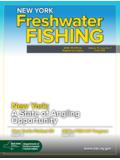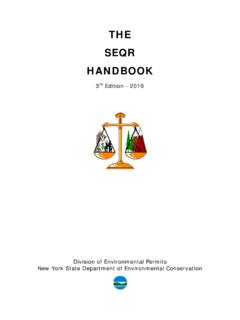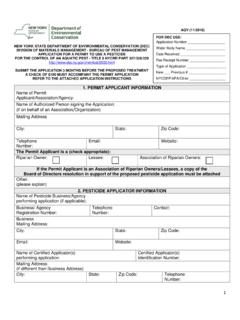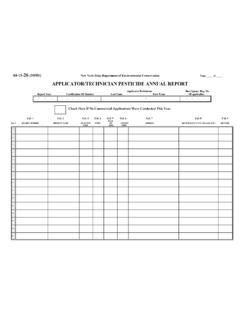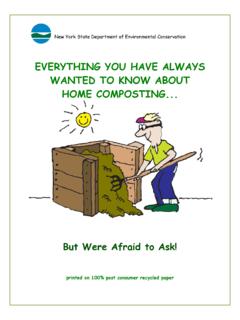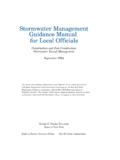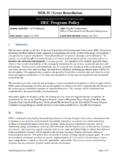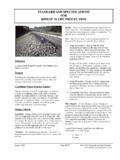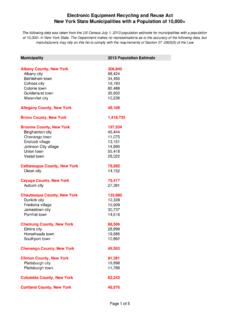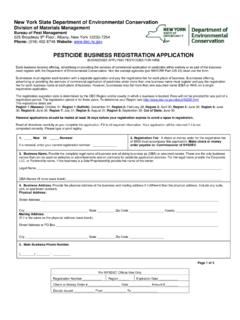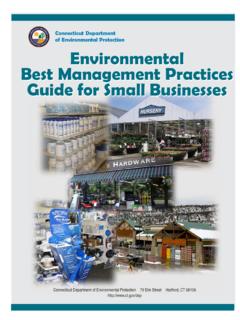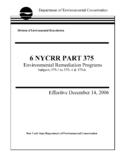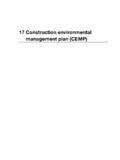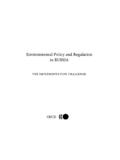Transcription of Environmental Compliance Guide for Auto Body Shops ...
1 New York State Department of Environmental Conservation Environmental . Compliance Guide . FOR. auto BODY Shops . DECEMBER 2009. New York State Small Business Sectors Environmental Results Program printed on 100% post-consumer recycled paper Acknowledgements This Guide was developed with assistance from the New York State Environmental Facilities Corporation and Empire State Development. NYSDEC also thanks the New York State Small Business Pollution Prevention/ Compliance assistance Council Members for their contributions to the content of this Guide . This Guide borrows heavily from existing written materials developed by several other states to address the Environmental concerns of auto body Shops . We would like to recognize the Environmental Results Programs in Massachusetts, Rhode Island, Maine, Delaware, Virginia and Washington. The authors extend their thanks for the contributions of these other programs to this Guide .
2 Please note: Environmental laws and regulations do occasionally change. If there are any regulatory changes that may affect auto body Shops , an updated version of this Guide will be posted on the NYSDEC. website at: October 2009 Environmental Compliance Guide for auto Body Shops i Table of Contents Section 1 - Introduction .. 1. Who is required to submit the Environmental Report Form? .. 1. When must the Environmental Report Form be submitted? .. 2. What benefits does a shop receive by completing the Environmental Report Form?.. 2. What happens if a shop does not submit the Environmental Report Form? .. 2. Who can you call for help with the Environmental Report Form or this Guide ? .. 2. Where can you get additional copies of the Environmental Report Form? .. 2. Section 2 - Pollution Prevention and Energy Efficiency for auto Body Shops .. 3. Pollution Prevention .. 3. Energy Efficiency .. 5. Section 3 - Common auto Body Shop Wastes.
3 7. Absorbents and Floor Dry .. 7. Aerosol Cans .. 7. Antifreeze .. 7. Brake Fluids .. 7. Car Prep and Body Work Wastes .. 7. Empty Containers .. 7. Gasoline .. 7. Lead Acid Batteries .. 8. Mercury Containing (Fluorescent) Lamps .. 8. Paint Booth Filters .. 9. Paint 9. Shop Towels .. 9. Solid Waste .. 10. Solvents .. 10. Solvent Distillation Still Bottoms .. 10. Used Electronics .. 10. Used Oil .. 11. Used Oil Filters .. 12. Waste Tires .. 13. Section 4 - Air 15. Exemptions from Part 201 and Part 228 and Subpart 6H .. 15. Subpart 6H Requirements .. 17. Record Keeping Requirements .. 19. Compliant Coatings Requirements .. 19. Requirements for Controlling Dust and Odor from Sanding and 20. Requirements for Minimizing Fumes, VOCs, and HAPs from Paints and Solvents .. 20. Spray Gun Requirements .. 20. Requirements for Cleaning Spray Guns, Metal Parts and Equipment .. 21. Subpart 6H Spray Booth Requirements.
4 21. Subpart 6H Filter Requirements .. 21. Subpart 6H Training Requirements .. 22. Requirements for Servicing Vehicle Air Conditioning Systems .. 22. October 2009 Environmental Compliance Guide for auto Body Shops ii Section 5 - Hazardous Waste .. 23. What is Hazardous Waste? .. 23. Determining How Much Hazardous Waste Is Generated at Your Shop .. 24. Determining Your Hazardous Waste Generator Category .. 26. Requirements for Conditionally Exempt Small Quantity Generators (CESQGs) .. 27. Best Management Practices for 28. Universal Waste .. 29. Section 6 - Bulk Storage and Spills .. 31. Petroleum Spill Reporting Requirements .. 31. Chemical (Hazardous Substances) Spill Reporting Requirements .. 31. Petroleum and Chemical Bulk Storage Tank Requirements .. 31. Petroleum and Chemical Storage Tank Registration Requirements .. 32. Section 7 - Water 33. Types of Wastewater .. 33. Wastewater Management Requirements.
5 33. Floor Drains .. 35. Maintaining Your Wastewater Treatment System .. 35. 36. APPENDICES .. 37. Appendix A - Resource Guide .. 39. - State Agencies .. 39. - NYSDEC Regional Offices .. 41. Appendix B - Air Permits and Registrations .. 43. - Determining Whether Your Shop Requires an Air Permit or Registration .. 43. - Calculating VOC Emissions .. 44. Appendix C - Making a Hazardous Waste Determination .. 45. Appendix D - Hazardous Waste Codes and Sample Manifest Form .. 49. Appendix E Small Business Self-Disclosure 53. October 2009 Environmental Compliance Guide for auto Body Shops iii - THIS PAGE INTENTIONALLY LEFT BLANK - October 2009 Environmental Compliance Guide for auto Body Shops iv Section 1 - Introduction All auto body Shops must comply with many Environmental laws and regulations that can be difficult to understand and that are often not written for any one particular industry. This Guide has been written specifically for the auto body repair industry to help auto body Shops understand and comply with these Environmental laws and regulations.
6 This Guide also provides information regarding best management practices, pollution prevention and energy efficiency that can help Shops further minimize human health risks and Environmental impacts, and save money. This Guide is also designed to help auto body Shops complete a new Environmental Report Form for auto Body Shops required for most Shops under a new program called the auto Body Shops Environmental Results Program (ERP). The auto Body Shops ERP applies to Shops that perform any of the following automobile refinishing operations: Collision repair;. Vehicle painting, paint stripping or sanding;. Body work;. Antique auto restoration; and/or Student training in any of the above areas. A shop is considered an auto body shop even if it does other kinds of work along with auto body work. For example, dealers or general automotive repair Shops that also do auto body repair are considered an auto body shop.
7 Who is required to submit the Environmental Report Form? The Environmental Report Form for auto Body Shops must be submitted by all auto body Shops that: 1. generate any hazardous wastes such as some spent solvents, gun cleaner and waste fluorescent lamps; and/or 2. that are subject to the New York State air regulations for surface coating processes (6 NYCRR. Part 228). A shop is exempt from 6 NYCRR Part 228 only if it complies with ALL of the following conditions: a. the shop uses a total quantity of no more than 55 gallons of coatings and cleaning solvents on an annual basis. (The shop must retain records of the quantities of coatings and cleaning solvents used on an annual basis for five years.);. b. the shop applies coatings to work areas no larger than square feet;. c. the shop applies coatings only using high volume low pressure spraying with a maximum cap pressure of psig;. d. the shop cleans spray guns only using techniques that minimize VOC emissions.
8 E. the shop uses only coatings that do not exceed the VOC content limits of 6 NYCRR Section (these VOC content limits are listed in Section of this Guide ); and f. the shop exhausts emissions into appropriate emission control equipment. Shops that are exempt from 6 NYCRR Part 228, and that do not generate any hazardous waste, are not required to submit the Environmental Report Form, however, voluntary submittal of the Environmental Report Form is encouraged. Completing the form will help Shops identify and correct areas not in Compliance , and enable Shops to be better prepared for random inspections by the New York State Department of Environmental Conservation (NYSDEC). Shops may also learn pollution prevention and energy efficiency practices that may help them to generate less waste and save money. 2009 Environmental Compliance Guide for auto Body Shops 1. When must the Environmental Report Form be submitted?
9 In general, auto body Shops will be given approximately 60 days from the mailing date of the form to return the completed form to NYSDEC. Shops will be advised of the exact due date of the completed form when the Environmental Report Form is mailed to them. What benefits does a shop receive by completing the Environmental Report Form? Compliance with Environmental regulations is required of all auto body Shops . Completing the form will help Shops identify and correct areas not in Compliance , and enable Shops to be better prepared for random inspections by NYSDEC. Shops may also learn pollution prevention and energy efficiency practices that may help them to generate less waste and save money. Also, as set forth in NYSDEC's Small Business Self Disclosure Policy (see Appendix E), NYSDEC will eliminate or significantly reduce penalties for small businesses that detect, voluntarily disclose and expeditiously correct violations discovered through Environmental audits or Compliance assistance .
10 Therefore, submitting the form gives Shops the ability to correct Environmental violations without penalties or with significantly reduced penalties. What happens if a shop does not submit the Environmental Report Form? auto body Shops that generate any hazardous waste or that are not exempt from 6 NYCRR Part 228 may be subject to enforcement action and penalties if they do not submit the Environmental Report Form. Who can you call for help with the Environmental Report Form or this Guide ? If you need any assistance understanding the information provided in this Guide or completing the Environmental Report Form, please contact the Small Business Environmental assistance Program (SBEAP) at 1-800-780-7227. SBEAP is a non-regulatory program administered by the New York State Environmental Facilities Corporation, and provides free confidential technical assistance to help small businesses achieve voluntary Compliance with Environmental regulations.
